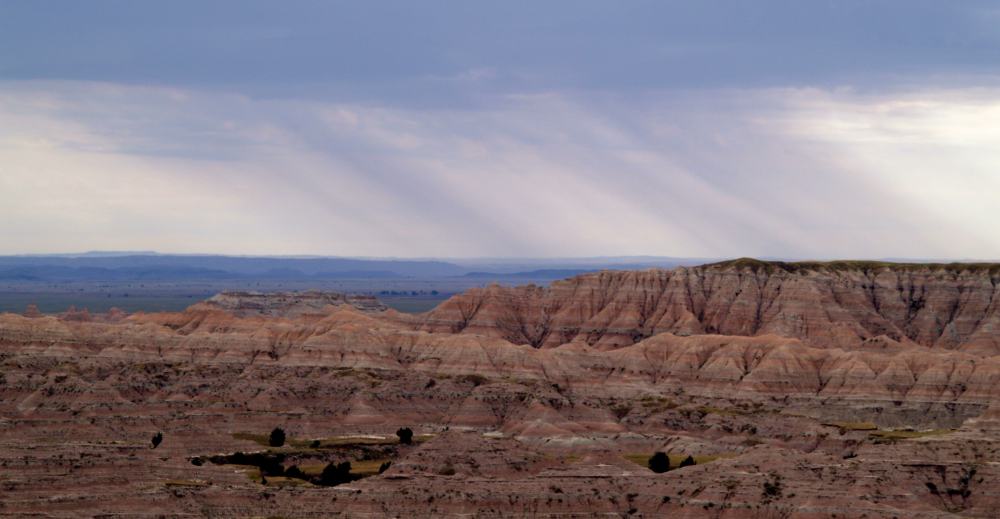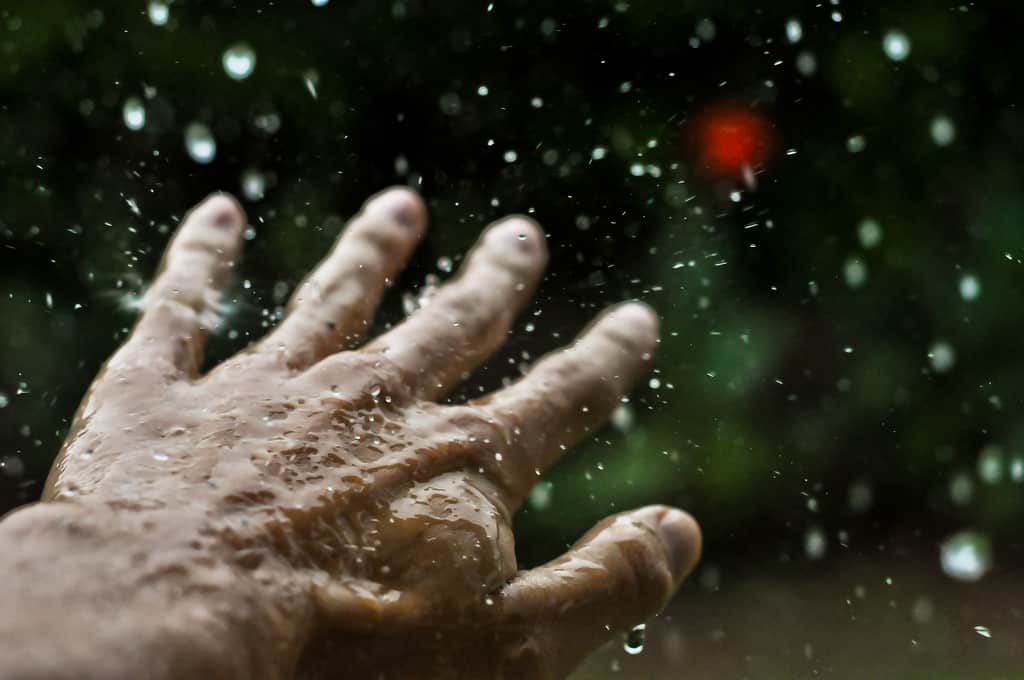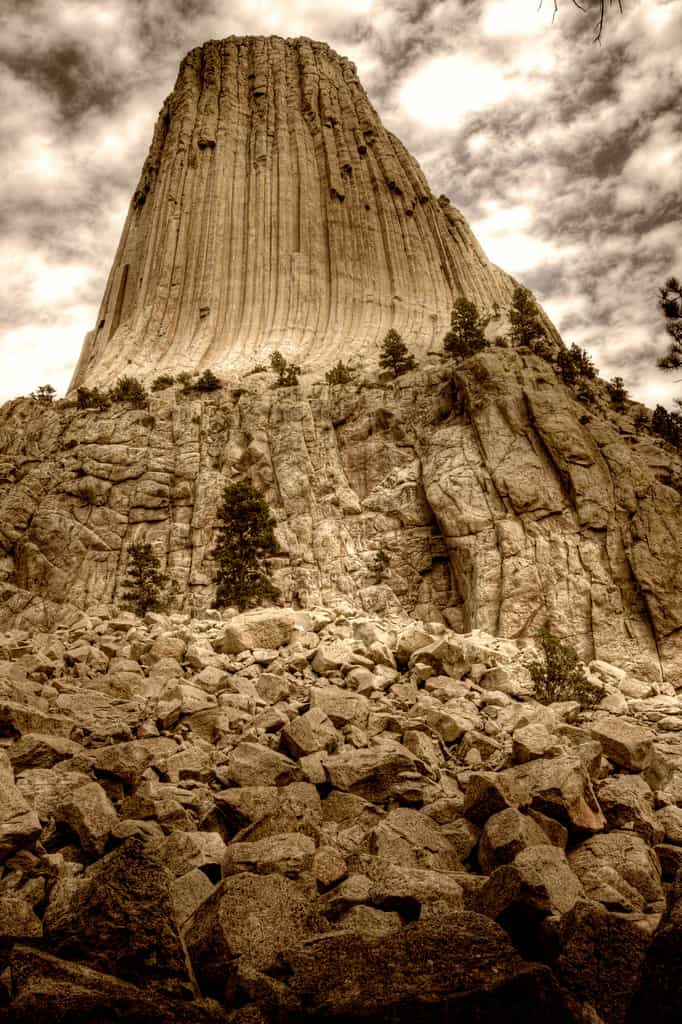Some who have observed him over the past 37 years at Red Cloud think that Brother Mike Zimmerman, tall, sinewy, wearer of industrial sized tinted eye-glasses and low-heeled brown boots, lead-footed driver of ancient army trucks and careening gunmetal Camrys, guardian of dozens of priceless keys, hands large and thick enough to… do something amazing with… some people think he walks like John Wayne.
I think that John Wayne walked like Brother Mike.
***
Brother Mike is in charge of the rain out at Holy Rosary Mission (better known as Red Cloud Indian School) on the Pine Ridge reservation. I mean he’s in charge of thinking about the rain and praying for the rain and when the rain arrives being grateful for it. And then praying for more rain. Praying heavily during mass – through quiet sighs and pregnant pauses – as if the rain or lack of rain has carved out a certain well in his body, a concave region from which these petitions rise up like steam off the lagoon in the northeast part of campus. From the middle of the second row in the Holy Rosary chapel, (Christ on a vision quest and the Virgin as White Buffalo Calf Woman supporting him from the walls) he begins: Father… we ask you for rain, for the livestock… so they don’t suffer. (Exhale). For this we… pray to the Lord.
The prayers come from this place in him heavily, with a weight of one whose cattle – cattle he does not raise but sees in the hills from his car or truck or thinks about at night in his room – are his. They are not his, but they are.
The former leader of the world-wide Society of Jesus (more precisely titled, “the General”) once said that the brother vocation can be seen, kind of, as a more pure vocation to religious life. “In some ways the religious brother embodies religious life in its essence,” said Fr. Kolvenbach.1 This is because one who desires to be a brother joins the Jesuits simply for the sake of being a Jesuit: serving people as a poor, chaste and obedient member of a Catholic order – not also to become a priest within the order, bearing the officially sacred duties that comes with it.
(Because I too chose to become a brother – in the wake of meeting Mike, among other things – saying all of this about the brotherhood could appear wildly, if mutedly, self-serving: the brother as the somewhat more grounded and authentic Jesuit because he doesn’t enjoy the privileges of priesthood. My spiritual director once pointed out, however, that religious brothers have every opportunity to be as “clerical” and officious as anyone else in the more hierarchical spheres.)
Nonetheless, a brother is a man who has given up mother and father and lands and so on to follow Christ in this way. But he is not a man who will ever breeze into a Catholic home on a late Saturday afternoon with the golden energy of one who can – given 25 minutes, a stole and a coffee table – wipe out a family’s Sunday obligation. He does not bear such magic. The brother plies his trade outside of chalice and paten. From the Jesuits’ founding in 1540, brothers were traditionally supporters of the priests, and the overall mission. “[Brothers] worked in kitchens, evangelized converts, trained native soldiers, shaped the art world, and conversed with emperors. All brothers were expected to bring Christ to others through spiritual conversation.”2
Today brothers live out their vocations as cooks, mechanics, house ministers, physicists, philosophers, astronomers, film directors, home builders. The role comes with little official power in the church. Even within the Society, a brother will never be provincial or house superior or novice director. While he is allowed to participate in a General Congregation – the highest governing body of the Society – he may not vote for a new general.
I don’t know if these strictures make Brother Mike a more true Jesuit than anyone else. I just know that he actually does have power. This is because we at the mission have needed him to fix or make, outside of dinner, so much of what we have. Mike was for years the superintendent of grounds at the mission of churches and schools on the Lakota reservation tucked into the southwest corner of South Dakota. I have no real idea how he repairs what he repairs, creates what he creates. I know how to do virtually none of what he does. I just know that he gets things done. Like most men, he seems to be happiest when he is working. (His second favorite undertaking, I would guess, is praying. Though for him, the space between these two vocations amounts to the thickness of a frayed Marian holy card).
He roams the school grounds in his long blue coveralls and a gray-blue or maroon paisley skull cap (skull caps so out of place and somehow perfect that they bear, willfully or not, the gravity of future third class relics). He strides the campus getting things done for and with Lakota co-workers. (He has tried hard to do less “for” and more “with,” which in recent years has become pretty much the point of the whole mission out here. Catholic missionaries in the past few decades have learned to take their cues from God, who himself minds his boundaries and doesn’t do everything for a free people.) A few years ago Mike turned over the position of superintendent to a local man he had trained. He now works under him.
***
I came to Red Cloud in 2007 as a Jesuit regent to direct campus ministry, to help make happen the spiritual life of the school. For three years I taught sacraments and social justice, planned spiritual retreats and liturgies, organized sweat lodge ceremonies and pilgrimages to Lakota holy sites. I did this in a school that for the past forty years – ever since the occupation of Wounded Knee by members of the American Indian Movement and the subsequent re-flourishing of the Lakota way on the reservation – has walked a delicate line between two spiritualities and cultures. The school is Lakota and Catholic, these being two similar (and pretty different) spiritualities. Generally, I think we tend to reverence and promote the life of both of them fairly well. Even if, at times, the journey of “reverencing well” can be something of a wily adventure.
Mike encouraged me all the time in this work – stick with it, keep it up. I could really hear this and trust this only after about the nineteenth time he said it. Finally it did sink in – about two months before I left. (Which, I am sure Mike would say, is not too late.) One evening, on my birthday, Mike walked over to me in the darkened kitchen and said, “Keep up the good work.” A young priest in the room heard him and was shocked. Later he told me that he had never, in five years there, heard Mike tell anybody something like that.
Brother Mike is, in short, a hard-edged, slightly mystical, highly sentimental and altogether surprising 79 year-old man with a burr haircut through whom God works in ways that could light up a small city. When I am around Mike, all of my doubts about the workings of the divine seem to be almost sheepish things. You feel he might just swat them away with a gigantic hand – get over it. Just being around him, you get the idea that it is possible to actually talk to God himself, and hear God himself, in one way or another, talk back.
One morning, Mike sat on a tawdry orange chair in the back TV room of the mission house, engaging a few of us in spiritual conversation. He talked about the time he was balancing on a ladder and reaching up and trying unsuccessfully to fit, I don’t remember, one thing into another thing. “Well then I just asked for his help and I’ll be damned if it didn’t work out,” he said. “He’s there for you, if you just ask him,” a man describing how to train, with love, some kind of luminous black lab. And you wonder why you make your own problems so hard. “The Father brings the increase,” Mike always says. “Just give it to him. He’ll bring the increase.”
***
The first time I worked at Red Cloud was for a semester during novitiate in 2004. It was a final test, or “experiment” we call it, before taking vows as a Jesuit. (Blindly, hopefully, I took them; vows of poverty, chastity and obedience; I was 32 with new Rockports and a chalice of blood to profess before, and still I had no idea what I was doing). Over those five months before vows, Mike would get after me for not locking the gym after theatre practice. Four or five times I forgot. (I’m sorry, okay? Sorry.) And each time he found out. The final time it happened he confronted me in the dimly-lit kitchen. He said without humor, in front of others, that I might need to bring my mother out here to keep me on track with this locking problem. I did not in this moment adore Brother Mike. And I was certain he was fed up with me too, that he would rather I never come back.
Three years later I did come back, to interview at the school as a possible assignment for regency. Mike picked me up at the airport. He was kind, thoughtful, easy to be with. He told me in so many words that he really wanted me to come. I was shocked. They assigned me and I came.
Along with my other religious duties I again directed theater. This time I kept the gym locked. Or, when I did forget – once or twice – I would suddenly remember and at 2 a.m. rush out to lock it. Mike never found out. (Until now. He has read this, he is still alive. This is not some kind of ultimately depressing memorial essay.)
***
For a while there, rain affected me more, because of the way Mike prayed for it. Rain came down into my life with a bit more purpose, more specificity. I knew cattle would suffer without it and this was no fun to think about. The summer I arrived, 2007, was one of the hottest summers in recent memory in western South Dakota. We were entering the seventh year of a brutal drought. Rain was a precious commodity, like gas in wartime. When rain did fall, I would ask Mike the morning after what the rain gauge held. Inevitably he would say, ”one-tenth.” I always could have sworn it was more than that. I was disappointed by how little rain there was, sad that his prayers seemed to carry about as much heft and substance as a kleenex.
Truth be told, though, I really didn’t believe praying for rain mattered. I don’t think God works like that. Does the Almighty really put his hand on the clouds and tip the water basin if enough people ask? I don’t buy it. Besides, if I pray for rain for my beef cattle and someone else nearby prays for sun for the Jimmy Red Hawk Memorial Softball Tournament, who wins? No one. Rain just happens.
But still, Mike prays, and I want him to pray, because really I want to be wrong. I want his prayer to matter. Some would say it does. Spiritual writers like to tell us that any prayer affects the person as much or more than it affects God. Supplication to the Lord keeps us humble, softens our hearts and wills, turns us into puppies. Something like that. I don’t know. But I don’t want that kind of prayer. I want to be wrong and have Mike pray and within minutes witness a torrent crash down, flooding the ditches and swamping the roads, so no one can do anything but be stuck. Be stuck and wonder if the brother at the mission is at it again.
***
One day I queried Mike about the promises of Christ. I had heard about them from a prayer I had recently memorized, the “Hail Holy Queen.” Pray for us, O Holy Mother of God, that we may be made worthy of the promises of Christ. Asking about such things is not surprising for one working on the reservation, trying to figure out how to go about this work. How to discern what the cousin spiritualities mean to each other. What does Christ promise about any of this? Mike looked at me and said, as if I was barely Catholic or sentient, “Well, Christ did promise us things.”
That’s it. He did not say what these promises would be. He did not even hint at them. It did not seem right to ask him again what the promises were. I was afraid he would just exhale deeply and walk off, look back at me, shake his head, keep walking.
I am waiting then for what I do not know, but I wait. I do not usually tender my accounts to the dreamy certainties of old-school devotions, except that Mike says they are there.
(I would like to point out that I am not trying to suggest that this religious brother is some new and infallible version of John of the Cross, or Hildegaard of Bingen. “Mike of the Badlands.” He’s not. The man can be wrong, and sometimes his hard edges can be, well, hard and edgy. But the way he talks about things such as these promises – the way they leave not only his lips but his very body – you think, okay, I’ll stick around. Something must be on its way.)
***
The day that I left the mission, still wondering what it had all been about, I walked into the carpenter’s shop where Mike was hanging out, glowing, happy. I told him that I was all packed, and that in about half an hour I would be leaving. He looked at the sawdust on the oily floor, then at me. He then said one simple and very kind thing to me about what, in his view, I’d accomplished at the school.
Maybe a hand-written note from Chief Red Cloud himself inviting me to be his personal spiritual advisor, maybe this would have felt better than these words. But maybe not. God knows, maybe it was a promise of Christ, raining down on the arid plains.
***
Cover image by Flickr user theclyde can be found here.
— — // — —




